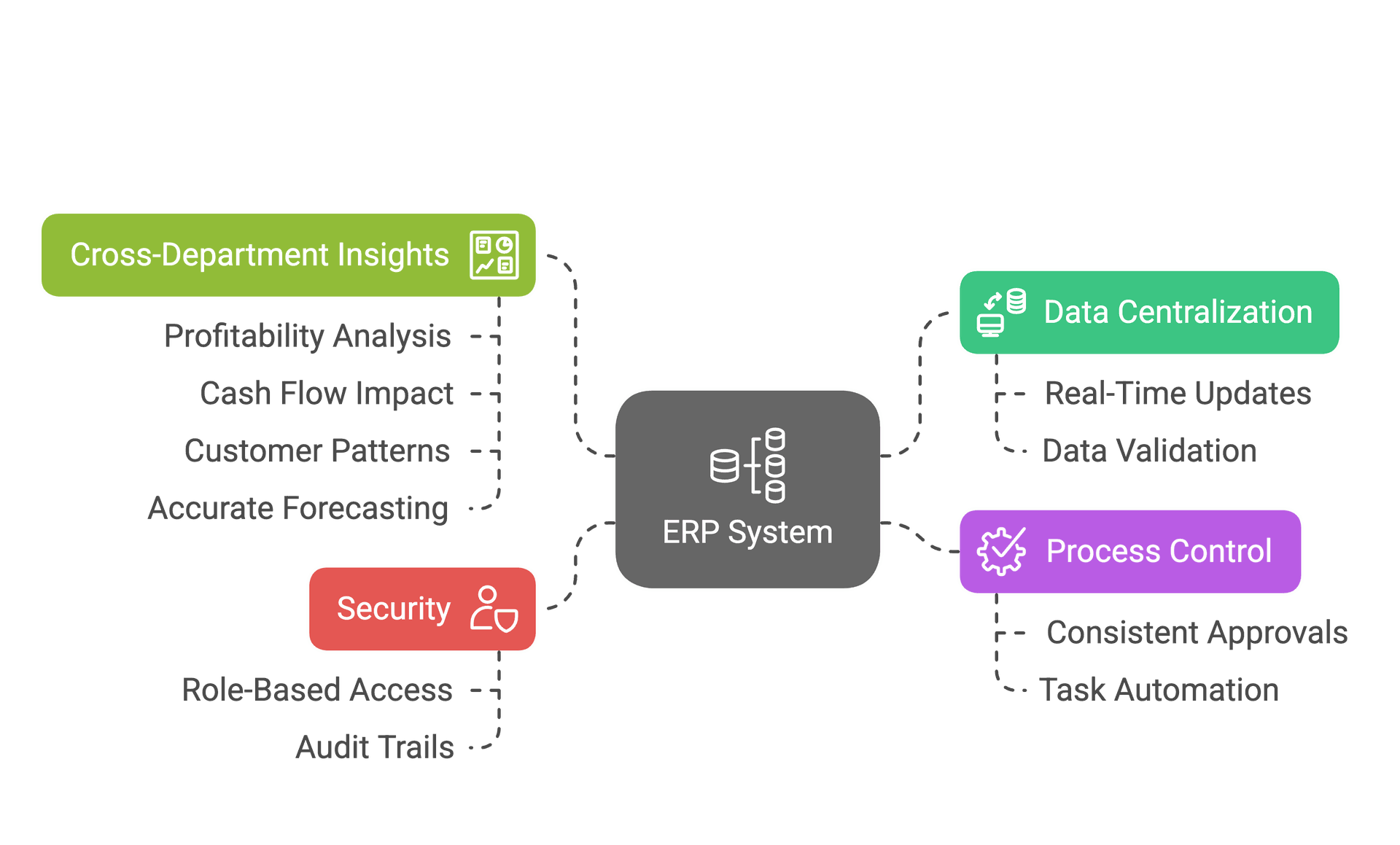If you've been running a growing business, you've probably heard the term "ERP" mentioned. But what exactly is it, and why should you care? Let's break it down in plain English.
ERP Demystified: What It Actually Means
ERP stands for "Enterprise Resource Planning" which honestly doesn't clarify much. In simple terms, an ERP is a central software system that connects all the important parts of your business.
Think of it as the digital headquarters where everything comes together. Your inventory knows what your sales team is doing. Your accounting department automatically updates when products ship. Your customer service team can see a customer's complete history instantly. Your production floor knows exactly what needs to be made and when.
Instead of separate systems that don't talk to each other (or worse, dozens of spreadsheets), an ERP creates one place where your business information lives and flows.
What Does an ERP Actually Do?
Imagine all your department heads sitting together, sharing real-time updates, coordinating perfectly, and making decisions based on complete information. An ERP creates the digital version of that room.
Here's what happens in practice: When a customer places an order, inventory immediately reserves those items. Shipping gets notified about what needs to go out. Your accounting system automatically creates an invoice. Procurement gets alerted if supplies are running low. Your management dashboard updates with the latest figures.
All of this happens automatically, without anyone manually entering the same information multiple times.

Why Businesses Eventually Need an ERP
Most small businesses start with QuickBooks, spreadsheets, and email contact lists. That works for a while.
But as you grow, problems arise: sales teams can’t see real-time stock levels, production miscalculates demand, and financial reporting takes days. These growing pains aren’t about inefficiency—they signal your tools haven’t kept up with your business.
The Real-World Benefits of an ERP
1. Everything in One Place
No more hunting for information. Everyone accesses the same system with up-to-date data. A customer calls with a question? Anyone can help them because all their history is right there. Need to check if you can fulfill a big order? The answer is a click away.
2. Automation of Tedious Work
Those repetitive tasks that eat up your team's day? An ERP handles many of them. It automatically reorders inventory when levels drop, generates invoices when orders ship, and creates production schedules based on orders. Your team gets freed up to focus on what humans do best—solving problems and taking care of customers.
3. Fewer Costly Mistakes
We've all been there: the duplicate order, the promised unavailable product, the invoice that never went out. These mistakes cost money. An ERP reduces these errors by preventing duplicate data entry, flagging unusual transactions, and enforcing consistent processes across your business.
4. Better, Faster Decisions
When you need to make an important business decision, how long does it take to gather all the relevant information? With an ERP, the answer is often "seconds" rather than "days." Want to know which products are most profitable? Which customers order most frequently? The data to answer these questions is readily available and trustworthy.
5. Room to Grow
An ERP gives your business the infrastructure to scale smoothly. Adding new product lines, opening new locations, or bringing on more staff doesn't mean reinventing your processes—your ERP grows with you.
Is an ERP Right for Your Business?
Not every company needs an ERP immediately. But if your team spends more time managing information than using it, if departments have conflicting data, or if reporting takes too long, it may be time.
ERPs Don't Have to Be Scary
ERPs were once only for big corporations, but modern solutions like Odoo are accessible to mid-sized and even small businesses. Cloud-based options offer flexibility without huge IT investments.
The Bottom Line: An ERP is About Business, Not Technology
Despite the tech-heavy name, ERPs are business tools. They eliminate friction, improve efficiency, and enhance customer experience.
When spreadsheets and disconnected systems start costing you time, money, and opportunities, an ERP might be your next step.